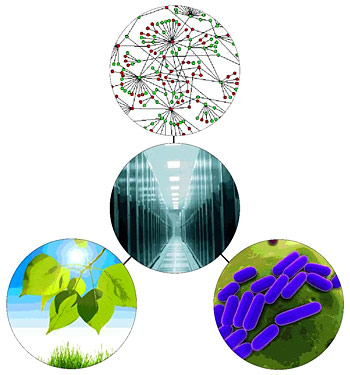Integrated ‘Knowledgebase’ on Plants and Microbes to Aid Energy Research
Program to support Department of Energy goals such as improved biofuel production, carbon sequestration, and environmental cleanup
July 18, 2011

Combining information about plants, microbes, and the complex biomolecular interactions that take place inside these organisms into a single, integrated “knowledgebase” will greatly enhance scientists’ ability to access and share data, and use it to improve the production of biofuels and other useful products.
A group of biologists and computational scientists at Brookhaven Lab and collaborators at Cold Spring Harbor Laboratory and Yale University are about to embark on a DOE-wide effort to integrate and make broadly accessible everything we know or can learn about plants and microbes — from the genetic and molecular to the organism and systems level — in support of DOE missions such as the production of biofuels, sequestering carbon in the ecosystem, and cleaning up environmental pollution. Project leaders have referred to this comprehensive, integrated "systems biology knowledgebase" (Kbase, for short) as a "computational equivalent of a manned mission to Mars."
"This systems biology knowledgebase (Kbase) will be a unique resource, bringing together multiple research communities and empowering them with computational tools to address fundamental biological questions, such as how physical characteristics of an organism can be predicted based on the information encoded in its genome," said Sergei Maslov, principal investigator (PI) for Brookhaven’s role in the effort. “Biomolecular networks I have been working on over the past 10 years are among the keys to meeting this challenge. The Kbase project that was conceived, piloted, and researched during the last couple of years now enters into the implementation phase.”
Seamlessly integrating multiple biological datasets in the Kbase will present considerable computational challenges. However the team of experienced computer scientists at Brookhaven and participating institutions — led by Dantong Yu of Brookhaven, a co-PI in the project — is ready to tackle these challenges. They will leverage the power of cloud computing, as well as high-performance computing resources across the DOE system of labs including Brookhaven, to handle the anticipated rapid growth in data volumes and computing requirements of the Kbase.
The Kbase will also feature social network elements facilitating collaboration and communication among scientists — much the way Facebook simplifies the exchange of information among friends. Shinjae Yoo of Brookhaven will contribute to developing social network tools as well as to solving current and future needs for data intensive computing at the Kbase.
The Kbase project has been launched following selection of the project team through thorough peer review, and is planned at a level of total effort of about $12 million per year for five years, funded by DOE’s Office of Science. Brookhaven’s Maslov is part of the overall Kbase leadership team, which is headed by Adam Arkin of Lawrence Berkley National Laboratory and also includes Rick Stevens of Argonne National Laboratory and Robert Cottingham of Oak Ridge National Laboratory. Cold Spring Harbor Laboratory co-PIs Doreen Ware and Michael Schatz and Yale University co-PI Mark Gerstein will also take part in the Brookhaven-led component of the Kbase project.
For more information about this effort, see these news releases from DOE and Cold Spring Harbor Laboratory.
DOE release: http://science.energy.gov/news/in-the-news/2011/07-07-11/
Cold Spring Harbor release: http://www.eurekalert.org/pub_releases/2011-07/cshl-sta071511.php
2011-2500 | INT/EXT | Newsroom









